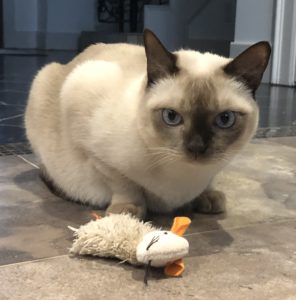How Does Your Vet Treat Cat Health Issues?

Rocket
How we cope with cat health issues
Cat health issues can be very challenging. As cat parents we absolutely want what is best for our cats, so when something goes wrong we go straight to the vet. Just like when our cars break down, trips to the vet are neither cheap nor convenient. Oftentimes our feline emergencies happen when the clinic is closed, and we find ourselves in “panic mode.”
Worried sick over Rocket
Feeling helpless is not a good place to be. I remember when Rocket was about four and half months old and suddenly wasn’t his active, happy kitten self. He had no interest in food, was very withdrawn and obviously felt bad. I was scared something seriously was wrong and sat in the lobby of the vet clinic at 7am when they opened, tears running down my face.
Thank goodness my husband was with me because he could actually communicate with the doctor. I know the doctor probably thought I was crazy because he even asked why I was so upset. “He’s going to be ok!” he reassured me. The whole event is still an embarrassing blur in my memory. I can’t even remember for certain what was wrong with him, but it may have been a parasite. The doctor’s reassurance cost me well over $200 I’m sure, and I would have paid more to make sure my baby was going to be ok.
This experience most likely rings true for any cat parent that’s had a sick kitty. In the medical world–both human and animal–it’s important to remember something: doctors practice medicine. They make educated guesses based on symptoms, diagnostics and tests, and sometimes they get it right. Other times not.

Hershey
Cause vs symptoms
The best approach to resolving any health condition is to first determine and then address the CAUSE. Treating symptoms will put you and your cat on a roller coaster that’s extremely difficult to get off. It will drain you emotionally, physically, and financially. The worst part is your cat becomes a player in a game he can’t win. Does this sound familiar?
Many of my cat clients reach out to me frustrated and hopeless with their cats’ conditions. They are conditioned to the conventional veterinary model of treating symptoms: medicine for pain or nausea, steroids for inflammation, and prescription diets that are “designed” for diseases and health conditions. And don’t forget extra drugs to offset the side effects of the other medications. It’s like being on a treadmill–you have a destination in mind but are stuck in the same place.
Typical examples of treating cat health conditions
Consider the following common examples:
- Steroids are prescribed for itchy, red skin (allergic dermatitis)
- Diabetic cats are prescribed dry food with levels of carbohydrates over 7%
- Cats with pancreatitis are often given a prescription diet that contains ingredients such as corn and peas that contribute to further pancreatic irritation.
- Cats who are vomiting are given rounds of anti-nausea drugs, antibiotics and pain meds
- Cancer diagnoses are treated with chemo, surgery and/or radiation
- Male cats with lower urinary track disease or crystals are still encouraged to eat dry food
- Infections are treated with multiple rounds of various antibiotics that may or may not work
- Runny nose and eyes may be treated with rounds of antibiotics when it’s unknown if the condition is bacterial or viral
- Hives and immune system reactions are treated with steroids
Ask your vet to connect the dots
All these approaches do little to discover the underlying cause of the cat’s condition. The symptoms are treated, masked or suppressed. In some examples when prescription or veterinary diets are used, the type of food or ingredients actually contribute to and exacerbate the condition or disease. This is absurd and mind-boggling to me!
In their defense, veterinarians are not taught in vet school to look for causes; they are taught how to treat symptoms, perform surgery, and prescribe drugs. They learn very little about nutrition. What they do learn is often presented by pet food manufactures who produce the food sold in clinics.
Doctors who approach their practice with an integrative, proactive or holistic mindset have a different approach. They realize the cycle of treating symptoms is futile. They learn to connect the dots between symptoms and causes.

Photo credit: Smart Cats by Bella C/Pinterest
Cats know what their bodies need
I feel our cats are sometimes smarter than us; they know there’s a better way, and they’re waiting for us to wake up. When I have forgotten to muscle test or recheck my own cats they have “told” me just by their actions when a medicine, supplement or treatment isn’t in their best good.
Hershey and Lili stopped taking particular supplements or medicine when they knew it was no longer needed. Hershey refused sub-q fluids when he knew it wasn’t beneficial. He also refused to by syringe fed when he was ready to eat on his own. In another example Lili refused to continue to eat a particular food. In each instance muscle testing confirmed their choices!
If vets would learn to muscle test it would change the way they practice medicine and actually make their diagnosis and treatments more effective.
My advice
There’s a time and place for emergency medicine, and thank goodness vets have this training! However, cat health issues, illnesses and diseases usually develop over a long period of time.
Here’s my advice to all the cat parents out there: the next time you find yourself at the vet’s office ask the doctor to identify potential causes of your cat’s condition. Ask questions about medication side effects, how long your cat would be expected to take the medicine, and how effective it is long term. What will the doctor’s next step be if the first step doesn’t work?
If you don’t like the answers you get pack up your cat and leave. Get a second opinion, and spend some time doing your own research on the internet. Look for all the potential causes of your cat’s condition and holistic and natural ways to address it.
Learn how to muscle test or find an expert in this who can assist you in ruling out or in whatever is in your cat’s highest and best good. This approach will save you time, money, frustration, and in some cases, your cat’s life.
Are you searching for answers to a specific condition with your cat? A cat health analysis may be just the thing to help get you on the right path!

